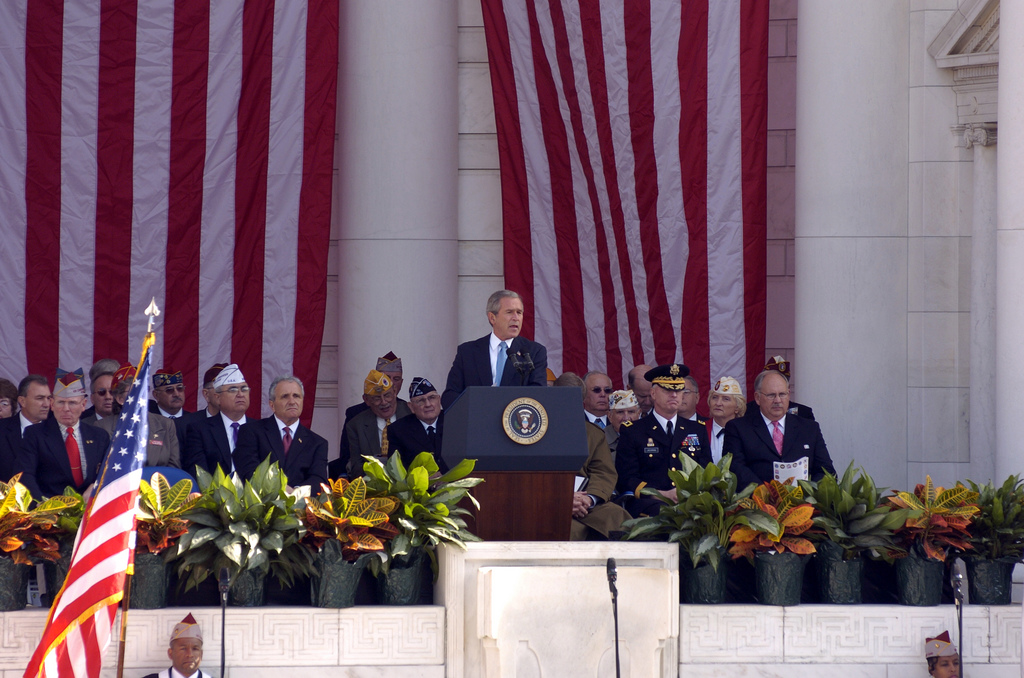
Views: 1067
 Destroyed Serbian Orthodox church in Kosovo by local Muslim Albanians after 1999
Destroyed Serbian Orthodox church in Kosovo by local Muslim Albanians after 1999
In 2000, when George W. Bush was elected president in a controversial and hotly disputed election, all the experts and pundits predicted that there would be a philosophical sea change in US foreign policy in the Balkans, and in Kosovo in particular. In my 2000 analysis of the election of Bush and US foreign policy in Kosovo, however, I concluded that the George W. Bush Administration represented the same old same old and business as usual. In my viewpoint, absolutely nothing would change in the US foreign policy stance on Kosovo. In fact, I concluded that the new regime was steeped in a Cold War mentality and represented the past and not the future.
George W. Bush would take US foreign policy a step backwards, not forwards. Moreover, the presence of Richard Perle as an adviser to George W. Bush did not bode well for the new Administration. Perle is a militant neocon ideologue committed to war and expansion abroad. He represented the past, not the future. He was an anachronistic Cold War ideologue who had no place in the new Administration. Condoleezza Rice is an expert in Russian, Russian history, Russian politics, and the Soviet Union. With the collapse of the Soviet Union in 1991, she was an anachronism and was selected merely because of nepotism because of her role in the Administration of George Bush, Sr. This is known as cronyism. She was not qualified for the job. Donald Rumsfeld was a veteran of the Richard Nixon and Gerald Ford Administrations. Dick Cheney was also a member of the Gerald Ford Administration. Colin Powell was a veteran of the Vietnam War and was the head of the Joint Chiefs of Staff during Gulf War I. He offered a practical and realistic counterweight to the ideologically driven Bush Cabinet. The Bush Administration offered nothing new, everything old.
During the US bombardment of Yugoslavia in 1999, George W. Bush was in full support of the Bill Clinton Administration policy on Kosovo. Bush was a carbon copy of Bill Clinton, only less sophisticated and more conservative. George W. Bush backed the illegal Kosovo war wholeheartedly and was even more hawkish than Clinton. Bush argued that the option of ground troops in a US/NATO invasion of Kosovo should not be taken off the table. George W. Bush was a hawk and gung-ho about the Kosovo War.
In the Presidential Debate with Vice-President Al Gore on October 11, 2000, held at Wake Forest University, Bush stated that he supported a regime change in Yugoslavia but not on the bogus premise of genocide but on considerations of the strategic interest of the US in NATO expansion into Southeastern Europe:
If I think it is in our nation’s strategic interests, I will commit troops. I thought it was in our strategic interests to keep Milosevic in check because of our relations in NATO, and that is why I took the position I took. I think it is important for NATO to be strong and confident. I felt like an unchecked Milosevic would harm NATO. So it depends on the situation, Mr. Vice President.
When asked about the US role in bombing Yugoslavia, Bush stated that he supported Bill Clinton in full:
Q: Is Milosevic’s defeat a triumph for U.S. military intervention?
BUSH: I think it is a triumph. I thought the president made the right decision in joining NATO in bombing Serbia. I supported him when they did so. I think it worked. I am pleased I made the decision I made, and I am pleased the president made the decision he made, because freedom took hold in that part of the world. There is a lot of work left to be done, however. I do not think he would have fallen had we not used force. I know there is some in my party that disagreed with that sentiment. The administration deserves credit for having made it work. I hope our European friends become the peacekeepers in Bosnia and in the Balkans. I hope that they put the troops on the ground so that we can withdraw our troops and focus our military on fighting and winning war.
Now why would he change his views in 2000? Would it be to get elected? Did he have some profound philosophical sea change? In my 2000 analysis of the prospects for the new Bush Administration in 2000, I concluded that very little looks to change in US foreign policy in Kosovo and that the election of the Bush Administration in 2000 represented “business as usual”, the same old same old. How accurate my assessment and evaluation was can be determined by a comparison and analysis of events in the interval from 2000 to 2007.
Originally published on 2007-07-28
Author: Carl K. Savich
Source: Serbianna
Origins of images: Facebook, Twitter, Wikimedia, Wikipedia, Flickr, Google, Imageinjection & Pinterest.
Read our Disclaimer/Legal Statement!
Donate to Support Us
We would like to ask you to consider a small donation to help our team keep working. We accept no advertising and rely only on you, our readers, to keep us digging the truth on history, global politics and international relations.
[wpedon id=”4696″ align=”left”]
FOLLOW US ON OUR SOCIAL PLATFORMS








